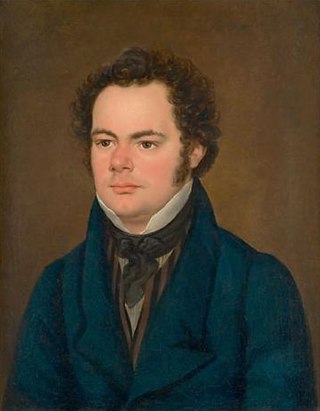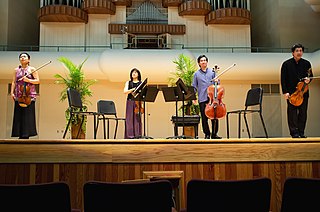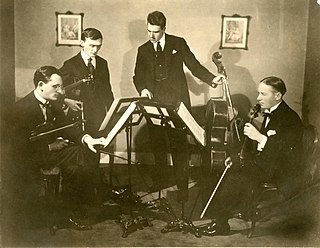
David Geringas is a Lithuanian cellist and conductor who studied under Mstislav Rostropovich. In 1970 he won the gold medal at the International Tchaikovsky Competition. He also plays the baryton, a rare instrument associated with music of Joseph Haydn.

Franz Schubert's final chamber work, the String Quintet in C major is sometimes called the "Cello Quintet" because it is scored for a standard string quartet plus an extra cello instead of the extra viola which is more usual in conventional string quintets. It was composed in 1828 and completed just two months before the composer's death. The first public performance of the piece did not occur until 1850, and publication occurred three years later in 1853. Schubert's only full-fledged string quintet, it has been called "sublime" and "extraordinary", been said to possess "bottomless pathos", and is generally regarded as Schubert's finest chamber work as well as one of the greatest compositions in all chamber music.

Erwin Schulhoff was an Austro-Czech composer and pianist. He was one of the figures in the generation of European musicians whose successful careers were prematurely terminated by the rise of the Nazi regime in Germany and whose works have been rarely noted or performed.
Joel Krosnick is an American cellist who has performed as a soloist, recitalist, and chamber musician throughout the world for over 40 years. As a member of the Juilliard String Quartet from 1974 to 2016, he performed the great quartet literature throughout North America, Europe, Asia, and Australia.
The Hollywood String Quartet (HSQ) was an American string quartet founded by violinist/conductor Felix Slatkin and his wife cellist Eleanor Aller. The Hollywood String Quartet is considered to be the first American-born and trained classical music chamber group to make an international impact, mainly through its landmark recordings. These recordings have long been regarded as among the most outstanding recorded performances of the string quartet repertoire.
James Zuill Bailey, better known as Zuill Bailey is an American Grammy Award-winning cello soloist, chamber musician, and artistic director. A graduate of the Peabody Institute of the Johns Hopkins University and the Juilliard School, he has appeared in recital and with major orchestras internationally. He is a professor of cello and Director of the Center for Entrepreneurship at the University of Texas at El Paso. Bailey’s extensive recording catalogue are released on TELARC, Avie, Steinway and Sons, Octave, Delos, Albany, Sono Luminus, Naxos, Azica, Concord, EuroArts, ASV, Oxingale and Zenph Studios.

The Ying Quartet is an American string quartet. The Ying siblings, from Winnetka, Illinois, formed the quartet in 1988 while studying at the University of Rochester's Eastman School of Music. The quartet began performing in the small town of Jesup, Iowa, as the first artists involved in the National Endowment for the Arts Chamber Music Rural Residencies Program. The original members of the quartet were Timothy and Janet Ying (violins), Phillip Ying (viola), and David Ying (cello). In April 2009, Timothy Ying announced his departure from the ensemble. In 2009, Frank Huang became the first violinist of the Ying Quartet. When Huang left the quartet in 2010 to assume the position of concertmaster of the Houston Symphony, Ayano Ninomiya was appointed first violinist of the Ying Quartet. Ayano Ninomiya was, in turn, replaced by violinist Robin Scott in 2015.

The Pacifica Quartet is a professional string quartet based in Bloomington, Indiana. Its members are: Simin Ganatra, first violin; Austin Hartman, second violin; Mark Holloway, viola; and Brandon Vamos, cello. Formed in 1994 by Ganatra and Vamos with violinist Sibbi Bernhardsson and violist Kathryn Lockwood, the group won prizes in competitions such as the 1996 Coleman Chamber Music Competition, the 1997 Concert Artists Guild Competition, and the 1998 Naumburg Chamber Music Competition. In 2001, violist Masumi Per Rostad replaced Lockwood. The group subsequently received Chamber Music America's prestigious Cleveland Quartet Award in 2002, the Avery Fisher Career Grant in 2006, and was named "Ensemble of the Year" by Musical America in 2009. In 2017, violinist Austin Hartman replaced Bernhardsson and violist Guy Ben-Ziony replaced Rostad.
The Ensō String Quartet is a US-based string quartet. Formed in 1999, it released three CDs on the Naxos Records label, one of which was nominated for a "Best Chamber Music Performance" Grammy award. It won a number of competitions, including the 2003 Concert Artists Guild, 2004 Banff International String Quartet Competition, and the Fischoff National Chamber Music Competition.

Hans Gál OBE was an Austrian composer, pedagogue, musicologist, and author, who emigrated to the United Kingdom in 1938.
Dan Coleman is a composer and music publisher.
The Ariel String Quartet is a string quartet based in the United States. It was formed in Israel in about 2000 by students at the Jerusalem Academy Middle School of Music and Dance, when its members were teenagers.

The London String Quartet was a string quartet founded in London in 1908 which remained one of the leading English chamber groups into the 1930s, and made several well-known recordings.
The New York Philomusica Chamber Ensemble is a musical ensemble founded in 1971 by A. Robert Johnson in New York City. The group presents an annual concert series of chamber music in New York City, Rockland County, and occasionally performs on tour. The ensemble owns the New York Philomusica Records label, which they use to sell albums of their music.
The Cassatt String Quartet was founded in 1985. Originally the first participants in Juilliard's Young Artists Quartet Program, the Quartet has gone on to win many teaching fellowships and awards and has toured internationally. Named after impressionist painter Mary Cassatt, the quartet is based in New York City.
The Hawthorne String Quartet is an American string quartet, all four of whose members are players from the Boston Symphony Orchestra. Although its repertoire ranges from the 18th century to contemporary works, the ensemble specializes in works by composers who were interned at the Terezín concentration camp during World War II and other "Entartete Musik" composers. Their recordings of music by three of these composers, Pavel Haas, Erwin Schulhoff and Hans Krása, were released on the Decca Records Entartete Musik series.
Anna Clyne is an English composer resident in the USA. She has worked in both acoustic music and electroacoustic music.
Elena Ruehr is an American musician, music educator and composer.
The Philharmonia Quartet Berlin is a string quartet founded in 1985 by members of the Berlin Philharmonic.

Ailbhe McDonagh is an Irish concert cellist and composer. She performs internationally as a soloist, chamber musician and recording artist with several studio albums to her name. McDonagh has composed works for orchestra, chamber music ensembles and pedagocial purposes. Collections of her compositions have been published by Boosey & Hawkes and are featured regularly in the ABRSM, Royal Irish Academy of Music and other exam syllabi. McDonagh is a professor of cello at the Royal Irish Academy of Music in Dublin, Ireland.







